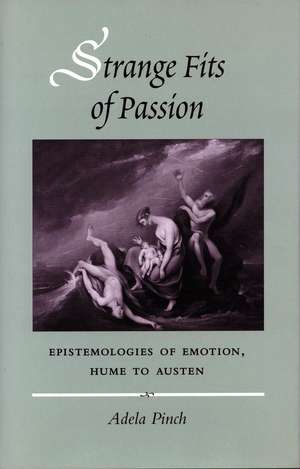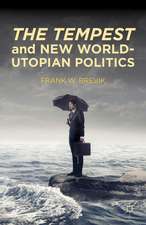Strange Fits of Passion: Epistemologies of Emotion, Hume to Austen
Autor Adela Pinchen Limba Engleză Paperback – 28 feb 1999
This book contends that when late eighteenth- and early nineteenth-century writers sought to explain the origins of emotions, they often discovered that their feelings may not really have been their own. It explores the paradoxes of representing feelings in philosophy, aesthetic theory, gender ideology, literature, and popular sentimentality, and it argues that this period’s obsession with sentimental, wayward emotion was inseparable from the dilemmas resulting from attempts to locate the origins of feelings in experience.
The book shows how these epistemological dilemmas became gendered by studying a series of extravagantly affective scenes: Hume’s extraordinary confession of his own melancholy in the Treatise of Human Nature; Charlotte Smith’s insistence that she really feels the gloomy feelings portrayed in her Elegiac Sonnets; Wordsworth’s witnessing of a woman poet reading and weeping; tearful exchanges between fathers and daughters in the gothic novel; the climactic debate over the strengths of men’s and women’s feelings in Jane Austen’s Persuasion; and the poetic and public mourning of a dead princess in 1817.
The book shows how these epistemological dilemmas became gendered by studying a series of extravagantly affective scenes: Hume’s extraordinary confession of his own melancholy in the Treatise of Human Nature; Charlotte Smith’s insistence that she really feels the gloomy feelings portrayed in her Elegiac Sonnets; Wordsworth’s witnessing of a woman poet reading and weeping; tearful exchanges between fathers and daughters in the gothic novel; the climactic debate over the strengths of men’s and women’s feelings in Jane Austen’s Persuasion; and the poetic and public mourning of a dead princess in 1817.
| Toate formatele și edițiile | Preț | Express |
|---|---|---|
| Paperback (1) | 192.70 lei 3-5 săpt. | |
| Stanford University Press – 28 feb 1999 | 192.70 lei 3-5 săpt. | |
| Hardback (1) | 701.52 lei 6-8 săpt. | |
| Stanford University Press – 28 feb 1997 | 701.52 lei 6-8 săpt. |
Preț: 192.70 lei
Nou
Puncte Express: 289
Preț estimativ în valută:
36.88€ • 38.36$ • 30.44£
36.88€ • 38.36$ • 30.44£
Carte disponibilă
Livrare economică 25 martie-08 aprilie
Preluare comenzi: 021 569.72.76
Specificații
ISBN-13: 9780804736565
ISBN-10: 0804736561
Pagini: 264
Dimensiuni: 152 x 229 x 25 mm
Greutate: 0.32 kg
Ediția:1
Editura: Stanford University Press
Colecția Stanford University Press
ISBN-10: 0804736561
Pagini: 264
Dimensiuni: 152 x 229 x 25 mm
Greutate: 0.32 kg
Ediția:1
Editura: Stanford University Press
Colecția Stanford University Press
Recenzii
"Superbly researched and conceptualized, Strange Fits of Passion is cogently argued, beautifully written, altogether an original, important contribution to late-eighteenth-century studies and romanticism."—Susan Wolfson, Princeton University
"It stirred feelings of admiration, gratitude, and wonder in this reviewer. It is well conceived, well researched, well argued, and well written, with good readings and plausible interpretations of a fresh assortment of texts."—Eighteenth-Century Fiction
"Pinch's excellent book ... is an admirably clear and incisive study."—Studies in English Literature
Notă biografică
Adela Pinch is Associate Professor of English at the University of Michigan.
Textul de pe ultima copertă
“Superbly researched and conceptualized, Strange Fits of Passion is cogently argued, beautifully written, altogether an original, important contribution to late-eighteenth-century studies and romanticism.”—Susan Wolfson, Princeton University
“It stirred feelings of admiration, gratitude, and wonder in this reviewer. It is well conceived, well researched, well argued, and well written, with good readings and plausible interpretations of a fresh assortment of texts.”—Eighteenth-Century Fiction
“It stirred feelings of admiration, gratitude, and wonder in this reviewer. It is well conceived, well researched, well argued, and well written, with good readings and plausible interpretations of a fresh assortment of texts.”—Eighteenth-Century Fiction
Descriere
This book contends that when late-eighteenth- and early-nineteenth-century writers sought to explain the origins of emotions, they often discovered that their feelings may not really have been their own.

















